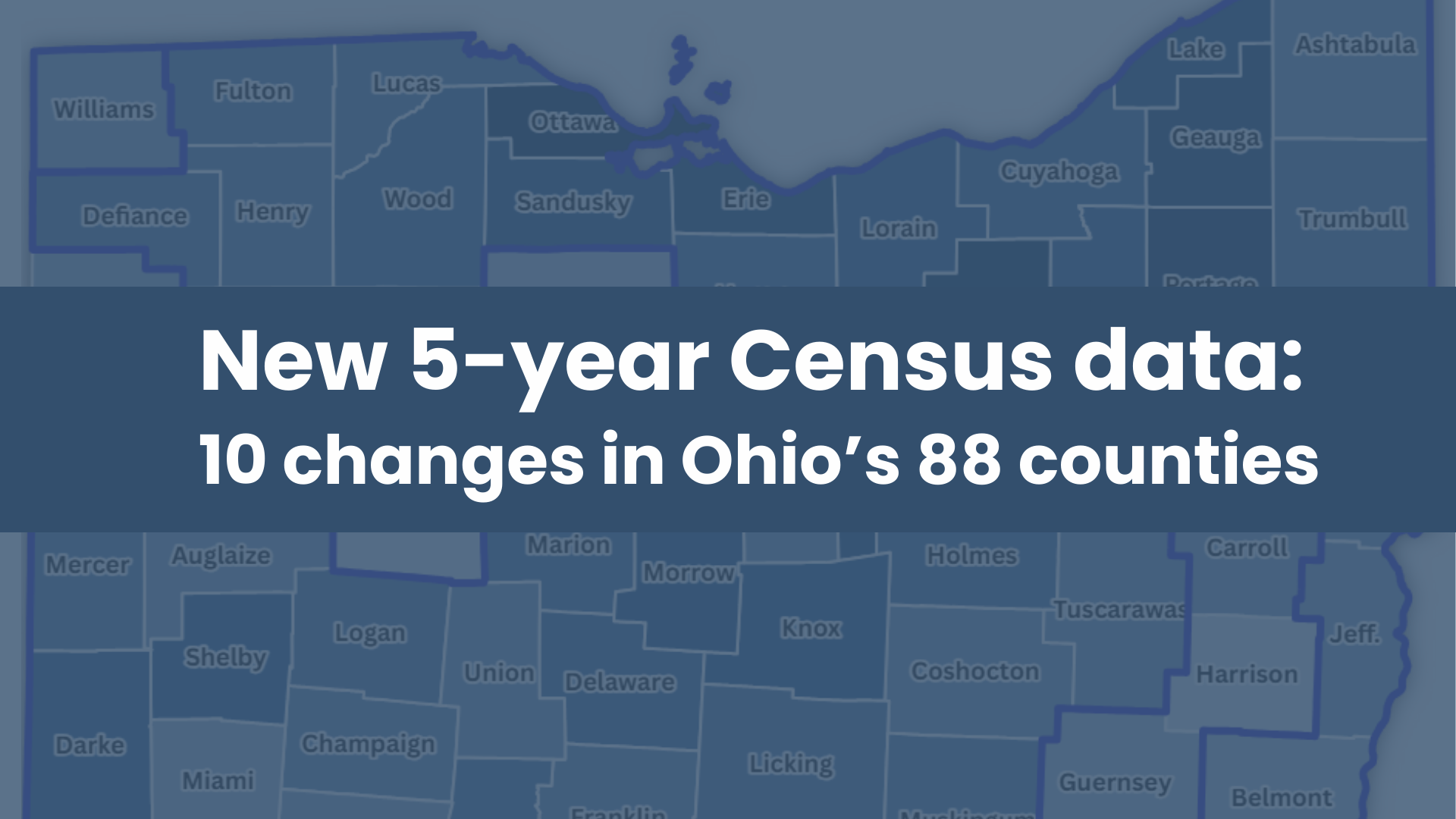The Cuyahoga County Health, Human Services, and Aging Committee met on April 5th, 2023, to consider several contracts. The meeting was Chaired by Vice Chairman Martin Sweeney.
The first item considered was an award of $10,000 over two years to Enterprise Community Partners. The funds were administered because of the American Rescue Plan Act, from the District 9 ARPA Community Grant Fund. District 9 is represented by County Councilwoman Meredith Turner.
Speaking on behalf of Enterprise was Ayonna Blue Donald, Vice President and Market Leader for the State of Ohio. After a brief introduction to Enterprise and the work that they do in the area of affordable housing, she explained some of the details of the grant. Enterprise has a group of individuals who meet in either meetings or focus groups, where they provide their input and expertise, based on lived experiences. Enterprise compensates these individuals, such as those who have been homeless or those who have been involved in the criminal and legal system, as their input and feedback is critical to the organizational development of housing programs. The grant will be awarded as an hourly stipend of approximately $30 per hour, which is the amount considered for a livable wage, if they participate in a meeting or $50 if they participate in a focus group.
The only question came from Councilman Dale Miller, who asked if a recipient receive the award once or multiple times. Donald said that the typical amount given per person is about $600, but it depends on the level of work, and frequency. The resolution was passed unanimously under the second reading.
Transportation services
The second item was a contract extension with AmeriCab, a provider of non-emergency transportation services, from February 28, 2023, to February 29, 2024, and additional funds of $4,000,000. Testifying on behalf of the county was David Merriman, Director of Cuyahoga County's Department of Health and Human Services (HHS), and Marcos Cortes, contract administrator for HHS. Cortes testified that AmeriCab provides transportation for county residents to medical treatment appointments. The contract calls for AmeriCab to provide up to 2000 trips on a monthly basis for up to 600 clients. The trips can take place anytime between 4:30 a.m. to midnight. The funding for this contract comes from the Temporary Aid for Needy Families (TANF) program.
The contract calls for AmeriCab to provide up to 2000 trips on a monthly basis for up to 600 clients.
Councilman Dale Miller opened the question by relaying a concern that was expressed by a constituent, whereby a resident shared an experience where they were not ambulatory but needed getting assistance getting into and out of a cab. Ultimately, the service was canceled. Miller asked if anything had been done to address that issue. Rick Holford, who is the Principal of Americab, testified that the driver for the client was instructed not to touch or assist the client into the vehicle for fear of violating the “ambulatory” portion of the contract. Eventually, Americab stopped providing the service because the client did need some assistance, so another provider was found for the individual's transportation needs. Miller said that “a little bit flexibility is needed” where the definition of ambulatory is applied so strictly that it includes whether a person needs some support to lean on a person to get into a vehicle. Holford agreed. The contract was approved under the second reading suspension.
Independent living contracts
The next contract was an extension of the OPTIONS for Independent Living contract, from December 31, 2022, to December 31, 2023, and for an additional amount not to exceed $4,476,500. The providers are listed below. Two providers, Honor and Compassion Homecare, LLC, and RX Home Healthcare, Inc. were removed.
- A-1 Health Care, Inc. in the anticipated amount of $281,000.00.
- Connect America in the anticipated amount of$116,000.00.
- Evolving Nurse in the anticipated amount of $21,000.00.
- Solutions Premier Services in the anticipated amount of $177,000.00.
- Rose Centers for Aging Well in the anticipated amount of $120,000.00.
- Senior Transportation Connection in the anticipated amount of $155,000.00.
- Tobi Transportation in anticipated the amount of $97,000.00.
- Transport Assistance in the amount of $25,000.00.
- Renaissance Home Health Care in the amount not-to-exceed $105,200.00.
- Family & Community Services in the amount not-to-exceed $70,000.00.
- XCEL Healthcare Providers, Inc. in the amount not-to-exceed $150,000.00.
- Purfoods, LLC in the amount not-to-exceed $442,000.00.
- Addus Healthcare in the amount not-to-exceed $24,000.00.
- Valued Relationships, Inc. in the amount not-to-exceed $155,000.00.
- U-First Homecare Services in the amount not-to-exceed $81,000.00.
- ABC International Services, Inc. in the amount not-to-exceed $21,300.00.
- Casleo Corporation in the amount not-to-exceed $2,276,000.00.
- First Choice Medical Staffing in the amount not-to-exceed $64,000.00.
- Geocare, Inc. in the amount not-to-exceed $100,000.00.
- Caring Hearts Health Services in the amount not-to-exceed $18,000.00.
- Healthy Home Care Transportation in the amount not-to-exceed $18,000.00.
- Home Care Relief Inc. in the anticipated amount of $190,000.00.
- LHC Group in the anticipated amount of $54,000.00.Testifying on behalf of the Cuyahoga County Department of Senior and Adult Services was Marcos Cortes, who provided a brief overview of the OPTIONS program. OPTIONS provides services through providers for a number of services meant to enable older adults and adults with disabilities to remain in their home. This includes home delivered meals, home making assistance, personal care transportation to medical appointments, and grab bar installation, among others. Cortes added that a new Request for Proposals (RFP) will be issued later this year.
Natasha Pietrocola, interim administrator for DSAS, as well as Cynthia Mason and Darlene Wade, who both oversee the OPTIONS program, also testified on the contract. Mason explained that the two providers who were removed are no longer in business.
HHSA Chairwoman Yvonne Conwell sent a series of questions to Vice Chair Sweeney to ask during the meeting. The first was to ask why this contract was late and if there were any outstanding invoices. Pietrocola replied that all of the 2022 contracts have been paid. She said that as soon as this contract extension goes through, then DSAS will begin paying the 2023 invoices.
How do providers submit payments and are they monthly?
Conwell then asked, “how do providers submit payments and are they monthly?” Pietrocola said, “yes, they are monthly.”
Have there been any conversations about moving the contract end dates? Cortes answered that the county is looking at extending contract end dates to March 31st, to allow for the county to continue to make payments at the end of the year.
The contract was approved under the second reading suspension.
Office of Homeless Services
The next three contracts were related to the Office of Homeless Services. The first contract was a contract award of $2,654,343, which would authorize a contract award until December 31, 2023, to Emerald Development and Economic Network (EDEN).
Speaking about the contract was Elaine Gimmel, Executive Director of Emerald Development and Economic Network (EDEN), Inc., Emma Pieta Barcelona, Chief Operating Officer, and Richard Carr Director of Real Estate Development and Construction.
Gimmel started by describing four different categories of assistance:
- Homeless Prevention and Diversion
- Property Landlord and Incentive Funds
- Housing Location Services
- Rapid Rehousing Extension
- For the Homeless Prevention and Diversion, the program anticipates serving up to 600 households and can be used for rent or utility arrangements, temporary hotel stays, housekeeping or household items.
- For the landlord incentives, the funds can be used to recruit and retain landlords to participate in the rental assistance programs that are administered by EDEN including security deposits, unit hold fees, or costs for tenant damages.
- For Rapid Rehousing Extension, the dollars are specifically earmarked for survivors of domestic violence. The rental assistance dollars extend the rental assistance duration from six months to 12 months, for those domestic violence households.
- For housing location: working with Legal Aid and NEOHC, to help Department of Children and Adult Services (DCFS) clients find affordable housing.There was a question submitted by Chairwoman Yvonne Conwell, asked by Vice Chair Sweeney, that inquired if these funds were used for diversion for those who test positive for COVID.
Gimmel explained it is for people who are on rental assistance. If their unit fails and they need to move immediately, we put them into a hotel.
Merriman added that the county has told providers that housing providers should have a specified area for those who test positive for an infectious disease like COVID since the county no longer is utilizing temporary shelter areas for those who are diagnosed with COVID.
This prompted a question from Vice President Sheryl Stephens, who questioned what the official protocol for those who do contract an infectious disease. She asked, if a person tested positive for an infectious disease like Hepatitis C, what happens?
Merriman said that the client would typically talk to their medical provider to find out the best method of care. Then, depending on the response received by the medical provider, that recommendation would be sent to the housing shelter facility. Some homeless shelters have rooms where people can be socially isolated, but not all. But that is one of the reasons why shelters are conducting renovations, as more shelters are moving away from a congregate setting, and where more privacy can be established for the client. Stephens followed up by asking how many homeless shelters there are in the county. Merriman replied eight.
Stephens asked if 2100 Lakeside, often the facility more associated with discussions on homeless services, has isolation rooms. Emily Reardon, who works in the Cuyahoga County Office of Homeless Services, said that they do not. Stephens said that, with health discussions now focusing on persons who may long COVID, she believes there should be rooms at shelters that are designated to provide supportive services for those who may have an infectious disease.
Miller clarified that these dollars are specifically designated from the General Fund as utilized by the American Rescue Plan Act (ARPA). The contract was passed under second reading suspension.
- R2023-0088: A Resolution making an award on RQ8737 to Joseph’s Home in the amount not-to-exceed $605,000.00 for building rehabilitation and homeless prevention strategies in connection with alternative housing and related services and support for COVID Recovery for the period 1/1/2023 – 12/31/2023; authorizing the County Executive to execute Contract No. 2873 and all other documents consistent with said award and this Resolution; and declaring the necessity that this Resolution become immediately effective.
Medical respite
The next contract was a $605,000 contract award for Joseph and Mary’s Home, a medical respite facility. Known for years as Joseph’s Home, the name has been changed to reflect the expansion of the organization's services to include women according to Beth Graham, the Executive Director. She explained that a medical respite home is a facility that is a go-between a hospital and a home for those who need medical care. Example of services available would be to those who are recovering from surgery, or recuperating from cancer treatment, serious chronic conditions such as renal disease, among other health conditions. Referrals come from hospitals, homeless shelters, and from other parts of the community. Most are over the age of 55, and the majority are African American, Graham noted.
The $605,000 contract award for Joseph and Mary’s Home, a medical respite facility, would go towards the $1.8 million cost of renovating the building.
The $605,000 would go towards the $1.8 million cost of renovating the building. Dale Miller asked about the number of private rooms. Graham said that the current capacity is 11. That will be unchanged in the new space. Mary’s Home has 10 rooms. The contract was approved under second reading suspension.
The next contract was an award for $4,798,000 to renovate the Norma Herr women’s shelter. Speaking on the contract was Elaine Gimmel, Executive Director of EDEN. Before she spoke, however, Merriman reminded the committee that EDEN owned the building that houses the Norma Herr women’s shelter. YWCA provides the services in the facility.
Gimmel and Carr both presented that monies for this contract will be used both for the rehabilitation and expansion of the Norma Herr shelter, but also for the construction of affordable housing units for homeless families. EDEN was asked by the city and county to own the facility about 20 years ago, and there have been two renovations since then. The current capacity is 175, but the goal post-renovation is to increase it to 203 beds. The timeline for the renovation will be between 24 and 30 months, approximately 2025, with a total project cost of approximately $21 million.
Miller asked how the property was acquired that would allow for the expansion of the current facility. Gimmel explained that last August, the owner of a building on East 23rd was willing to sell and that EDEN was able to acquire it and an adjacent property. Miller asked about the relocation process of current residents of the facility. Gimmel said that her agency is still working out the logistics, including location and timing. The funding will come from the city, county, and from private financing sources, according to Carr.
The final question was posed by Vice Chair Sweeney who asked how long the average length of stay is at the facility and who determines how long one can stay. Gimmel said that there is not a limit, but it’s a low-barrier shelter, so people can stay as short as one night, to 30 days, to a year, or a few years. She said that there are sometimes reasons people need to stay longer. Merriman added that is a question that would likely need to be discussed by the community, but that there is no stay limitation currently. The goal, he added, is to make sure that people have the support that they need to eventually find stable housing and shorten the length of stay.
The contract was passed under the second reading suspension.
Fatherhood Initiatives
The final contract was a contract extension from March 31, 2023, to March 31, 2024, with an additional $825,500 for the Cuyahoga County Fatherhood Initiative. Presenting on behalf of the county were David Merriman, Marcos Cortes, and Al Grimes. After a brief introduction to the Fatherhood Initiative programs, Cortes said that the program serves 5,900 fathers annually across the county. It’s for dads from across the county, no matter what geographic location of the father, as well as those who are currently fathers, those who are about to become fathers, and prevention information those who do not want to consider fatherhood yet. Grimes mentioned that the office has just received a grant to host the 17th annual Fatherhood conference. Grimes mentioned the county offers these programs for fathers because when both parents are involved in the lives of their children, children are less likely to commit suicide, less likely to drop out of school, and less likely to do drugs. The only question that came up was from Councilwoman Conwell, who asked if the department was up to speed in reimbursing providers. Grimes said that there are some providers that the county is in the process of reimbursing, a theme that has played out across multiple Health, Human Service, and Aging meetings over the past few months.
The Fatherhood Initiative serves 5,900 fathers annually across the county.
Councilwomen Meredith Turner closed the questions by asking how many locations there are for the Boot Camp for New Dads. Grimes replied that there are nine locations across the county.
The contract was approved under second reading suspension and forwarded to the full Council for consideration. The meeting was then adjourned.
Fatherhood Initiative Agreements and Contracts:
- Agreement No. 1046 with Cuyahoga County District Board of Health in the amount not-to-exceed $70,000.00 for the Prevent Premature Fatherhood Program.
- Agreement No. 1058 with The MetroHealth System in the amount not-to-exceed $44,000.00 for the Boot Camp for New Dads Program.
- Contract No. 1054 with Career Development and Placement Strategies, Inc. in the amount not-to-exceed $100,000.00 for the Rising Above Program.
- Contract No. 1061 with The Centers for Families and Children in the amount not-to-exceed $83,000.00 for the Families and Fathers Together Program.
- Contract No. 1055 with The Children’s Museum of Cleveland in the amount not-to-exceed $32,000.00 for the Dad’s Court Program.
- Contract No. 1057 with Domestic Violence and Advocacy Center dba Journey Center for Safety and Healing in the amount not-to-exceed $117,000.00 for the Supervised Visitation Program.
- Contract No. 1056 with JDC Advertising in the amount not-to-exceed $70,000.00 for a Public Awareness Campaign.
- Contract No. 1059 with Murtis Taylor Human Services System in the amount not-to-exceed $60,000.00 for the Strong Fathers Program.
- Contract No. 1060 with Passages Connecting Fathers and Sons, Inc. in the amount not-to-exceed $100,000.00 for the Jobs for Dads Program.
- Contract No. 1062 with Towards Employment in the amount not-to-exceed $97,500.00 for the Fatherhood Career Pathway Program.
- Contract No. 1063 with University Settlement, Incorporated in the amount not-to-exceed $52,000.00 for the Healthy Fathering Program.
April 19 HHSA contract focused on renovating and expanding the temporary housing and recovery facility of Y-Haven
The Cuyahoga County Health and Human Services Committee met on April 19th, 2023 to consider one featured contract. The featured contract consisted of an award to the YMCA of Greater Cleveland in the amount of $627,786.
Presenting on behalf of the county was Michelle Sirak, Director of the Office of Homeless Services. She talked about the details of the contract, which will allow for Y-Haven to renovate and expand its temporary housing and recovery facility. The new facility will now include services for up to 24 women. Y-Haven is a shelter operated by YMCA that supports returning citizens, unhoused individuals, and those who are recovering from addiction, through temporary housing services and mental health treatment.
Councilman Miller started the questions by asking how the services are paid for at Y-Haven.
Ed Gemerchak, Vice President of Behavior Services at YMCA and Executive Director of Y-Haven responded that there is a separate contract for operational support and that this contract would only be utilized for capital expenses. Councilwoman Yvonne Conwell asked if there will be a new operational contract when it is presented, now that the scope of services will be changing. Sirak replied that it would be a new contract presented because it will cover both men and women.
Councilwoman Conwell asked if any of the repairs have begun at Y-Haven and who will be completing the repairs. Gemerchak said that the renovation had not yet started and that repairs will be completed by Studio Techne. He said that although renovations have not yet begun, they have been able to provide supporting services to five women, due to having some empty beds.
How often the county will be receiving invoices for the work being done?
Councilwoman Conwell asked how often the county will be receiving invoices for the work being done. Sirak replied that the county expects to be invoiced quarterly and the payments will be made from the ARPA dollars that are in the General Fund.
Councilwoman Conwell asked if individuals would be displaced during the renovation process of the Y-Haven. Gemerchak said that some individuals would be moved to CMHA space, still in the same building, while the renovation was taking place, but there would be no service interruption.
The resolution was approved under second reading suspension. Usually, the County Council has stated that ARPA General Fund allocations would go through three readings (and thus pass out of committee under second reading). However, for several Office of Homeless Services contracts, including the April 5th HHSA meeting, they were passed under second reading suspension, according to Trevor McAcleer, Budget Advisor to County Council.
The meeting was then adjourned.







